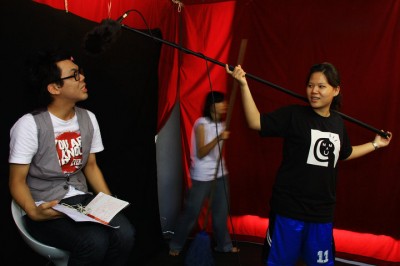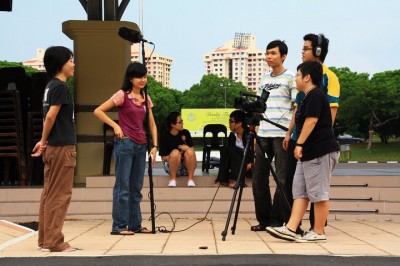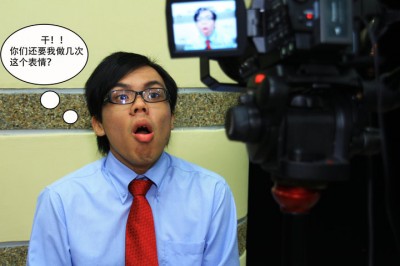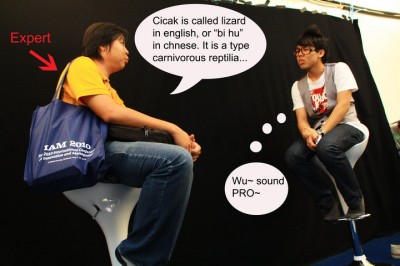Loo Que Lin, 23, graduated from US with a major in Broadcasting and minor in Acting and Directing. A former student activist in USM, Loo is also actively involved in national student movement. Loo is currently urrently working in video production house and also one of the Secretariat member in Suaram (Suara Rakyat Malaysia) Penang Branch. She believes using video as a advocacy tool for human rights issues is really a right way to approach people, especially the younger generation. Her ultimate goal is to set up a peoples’ (rakyat) non-commercial television station.
Loo’s “Pilih” about campus elections is one of three short documentaries that will be premiered at this year’s FreedomFilmFest. The film will be screened on Oct 16, at 8pm in Petaling Jaya. There will also be screenings in Johor, Penang, Sarawak and Singapore.


“Pilih” is a short film in a talk-show format that covers the democratic space in universities – campus elections. Discussions in the interviews and dialogue are aimed at taking a critical look at whether higher learning institutions empower our youths to participate in the democratic process and be a part of an engaged society or if the opposite is true?
“Pilih” focuses on analysing the reality of campus elections today and highlighting the importance of nation building through people building. It aims to illustrate why our youths today generally have a “tidak apa” attitude towards how a democracy functions – at the university level and the national level.
2. Why did you choose this premise for your film?
The Majlis Perwakilan Pelajar (MPP) is a council of the student representatives. It should be their duty to collect, compile, and be a conduit for the collective student voice to affect constructive change for students. However after the AUKU/UUCA amendments, student unions which were the bodies that really had power was replaced by the MPP, a toothless tiger. Students know this and are therefore not interested in the MPP. They feel that it cannot have any positive impact in their university life. Hence, the campus election which is to elect student representatives does not garner much student interest.
Students have lost sight of how important it is to elect a representative that can fend for student welfare. This already injured democratic process is further maimed by the universities’ involvement whenever they notice a candidate that is truly championing student welfare and gaining ground. They see the fight for student welfare as a fight against the university.
The current situation is troubling as students’ rights – not just as students but as human beings – are being trampled on in full public view.

The main reason is because I witnessed lots of unfair and ridiculous incidents in university. I was inspired to start on the topic of campus election because of what I experienced when I was one of the candidates in the campus election during my second year. The moment I stood on the stage for my public speaking I felt sad, a bit of pain in my heart is not because of my public speaking but because of the students on the floor, many of the students aligned to my opponent were shouting, screaming, cursing, acting very rudely and irrationally. At that time, I thought, what has happened to all these students?
Do they really know about what is campus election for? Do they really care about who gets elected? Or is this is only a so called democracy-playground – let the students fight with each other without knowing what is the true purpose of their “fight” and what they are fighting for.
Ideally the reason we stand out to compete in campus election for a better student welfare and a better system in university. But instead we end up with a 3-day carnival for candidates, their supporters and students too. I think this is a very serious problem. Student must understand their rights, what is democracy, what happen if they choose to not involve themselves in university policy matters. How do we expect a student without a grasp on the right concept of democracy to become a good citizen in society? I think, people expect more than just a good result student from university.

4. What were the hurdles and difficulties that you faced in making this film?
The biggest headache was securing an interview with the university for its opinion on the matter. They did not respond to all the 3 letters we had sent. Since pre-production we had sent them invitation letters – via e-mail, via telephone, made appointments, and we even went to the universities’ student affairs department (HEP). One of the universities that were our first preference to be interviewed, repeatedly postponed our appointment – “besok baru tahu“, “naib-canselor sangat busy, next week call back“. There were endless excuses up till we were towards the end of wrapping production. This means they couldn’t give us one hour in the span of 3months. We are very disappointed in their lackadaisical attitude towards the issue at hand which affects undergraduates.

Hope this video can really capture people’s attention, especially the youths! I want them to talk about it, no matter the issue or the way this video present. I hope people who watch it will feel they want to do something about it! Awareness should be followed by action – that is what I expect from my audience.
